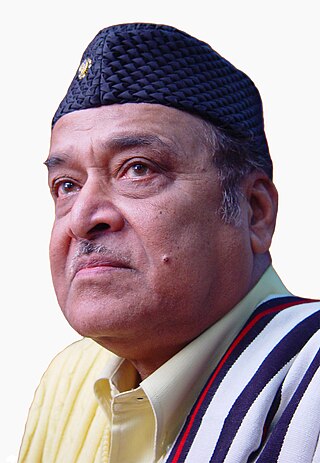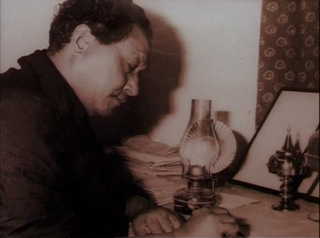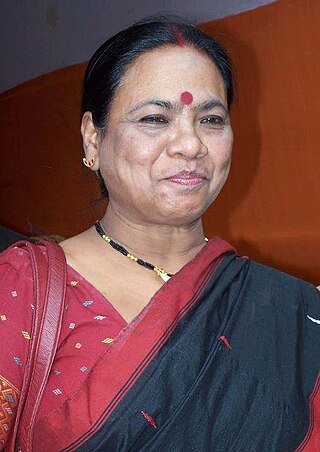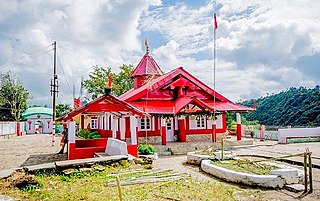
Assam is a state in northeastern India, south of the eastern Himalayas along the Brahmaputra and Barak River valleys. Assam covers an area of 78,438 km2 (30,285 sq mi). It is the second largest state in northeastern India by area and the largest in terms of population. The state is bordered by Bhutan and Arunachal Pradesh to the north; Nagaland and Manipur to the east; Meghalaya, Tripura, Mizoram and Bangladesh to the south; and West Bengal to the west via the Siliguri Corridor, a 22-kilometre-wide (14 mi) strip of land that connects the state to the rest of India. Assamese and Boro are the official languages of Assam. Meitei (Manipuri) is the official language of Hojai district and the entirety of the Barak Valley districts, while Bengali is an official language in the three districts of Barak Valley.

Bhupen Hazarika was an Indian playback singer, lyricist, musician, poet, actor, artist, editor, filmmaker, professor and politician from Assam, widely known as Sudha Kontho. His songs were written and sung mainly in the Assamese language by himself, are marked by humanity and universal brotherhood and have been translated and sung in many languages, most notably in Bengali and Hindi.

Assamese cinema is the Indian film industry of Assamese language. It is based in Assam, India. The industry was born in 1935 when Jyoti Prasad Agarwala released his movie Joymoti. Since then the Assamese cinema has developed a slow-paced, sensitive style. In the beginning the industry were called Jollywood, for Agarwala's Jyoti Chitraban Film Studio.

Bishnu Prasad Rabha (1909–1969) was an Indian cultural figure from Assam, known for his contributions in the fields of music, dance, painting, literature as well as political activism. As an advocate of people's cultural movement, he drew heavily from different genres of classical and folk cultural traditions. Considered a doyen of the Culture of Assam, the Assamese people affectionately call him Kalaguru. He is also called by Marxists as Sainik Silpi for his active participation in the armed struggle, led by the Revolutionary Communist Party of India (RCPI).

Khagen Mahanta was a singer and composer of folk and traditional music of Assam. Khagen Mahanta was a notable person in Assamese folk music and known as the "King of Bihu". His Bihu songs, Borgeet and other folk songs remain popular in Assam. The artist, along with his wife Archana Mahanta and son Angaraag Mahanta who is known as Papon, represent one of the most influential families in Assamese music. He died on 12 June 2014.

Chetana Das is an Indian actress from Assam. She is popular face in Assamese cinema for her comic roles. She is the comedy queen of Assamese film industry.

Ajan Faquir Saheb is an Assamese language biographical film produced by Bani Kalita and directed by Asif Iqbal Hussain. The film was released on 25 April 2008. The film is based on the life of Ajan Fakir, the Sufi saint and poet who came to Assam from Baghdad.

Joi Barua is an Indian singer and music composer. Born in Digboi, Assam, he started his career by singing advertising jingles and later did playback singing for Hindi, Assamese and Telugu films. He is also the lead vocalist of the band Joi. Barua has a mixed musical style incorporating elements of rock, soul, jazz, folk and world music.

Jaya Seal Ghosh is an Indian actress and dancer. She started learning Bharatanatyam from a very early age under Guru Indira P. P. Bora for five years. Simultaneously, she was also acting in Assamese television and did plays with noted Assamese theatre personalities from NSD like Dulal Roy and Baharul Islam who inspired her. She went to the National School of Drama in New Delhi where she subsequently completed her three-year course in 1997.

Basundhara is a 2009 Indian Assamese drama film directed and produced by Hiren Bora, with a screenplay by Sagar Sangam Sarkar, Birinchi Kumar Medhi and Bora himself. It stars Barsha Rani Bishaya in the title role, and Saurav Hazarika, Bishnu Kharghoria, Ifftikar Ahmed, and Prithiraj Rabha in other major roles. The film deals with a pressing contemporary ecological issue of human-elephant conflict in the region of Assam.

The most significant and a landmark development in the cultural life of Assam was the establishment of the Baan Stage (old) or Baan theatre, the first modern Assamese theatre hall at Tezpur in 1906. The Baan Stage gave a platform for development of the Socio-Cultural scene of Assam. The great cultural trio Rupkonwar Jyoti Prasad Agarwala, Kalaguru Bishnu Prasad Rabha and Nata Surya Phani Sarma blossomed here. Phani Sarma along with Bishnu Rabha directed the most successful Assamese movie Siraj.
Rajni Basumatary is an Indian filmmaker and actress, best known for her role of Mary Kom's mother in the 2014 Hindi film Mary Kom. Basumatary has written and produced the highly acclaimed feature film Anurag. Her directorial debut Raag was released in all major cities in India in 2014.

Nishita Goswami is an Indian actress who works in Assamese language films. Her notable Assamess Movies are Rong, Ratnakar, Hold My Hand, Mon, etc. She has also acted in a number of stage dramas.
Ravi Sarma is an Indian actor who works in the Assamese cinema. He has starred in films like Hiya Diya Niya, Tumi Aahibaane, Iman Morom Kiyo Lage, Aami Asomiya, Sri Raghupati etc.

Hinduism is a minority religion in the Meghalaya state of India constituting 12% of the state's population. The Nartiang Durga Temple in Meghalaya is one of the 51 Shakti peethas on Earth and is considered by Hindus of Meghalaya as the permanent abode of Goddess Durga. Hinduism is a popular religion practice by Rabhas, Hajongs, Kochs, Rajbongshis, Mikirs, Bengalis, Nepalis, Biharis etc.
Surjya Kanta Hazarika is an Assamese litterateur, an eminent scholar, author, publisher, playwright, lyricist, composer, cultural activist, feature film and documentary maker, social worker and philanthropist. Hazarika is a recipient of the Padma Shri Award in 2008 for his contribution to Literature & Education. He is the current president of Asam Sahitya Sabha.
Prabhat Mukherjee (1917-1997) was an Indian film director, actor and writer. He is known for his work in Bengali, Assamese, Odia and Hindi language films.

Piyoli Phukan is a black & white Assamese language film directed by Phani Sarma, released in 1955. The film is based on the life and struggle of a historical character of Assam, Piyoli Phukan, son of Badan Borphukan, who revolted against British occupation. He was sentenced to death and hanged in 1830 at Jorhat. The film is produced by Gama Prasad Agarwalla under the banner of Rupjyoti Productions, Tezpur, Assam. Music is composed by Bhupen Hazarika. Piyoli Phukan is the first Assamese film, which got national recognition. The film was honoured by the Certificate of Merit in State Awards, 1956.
Sarodi Saikia is an Indian classical dancer, dance teacher and chetar player from Assam. She is best known for her Sattriya dance. Saikia received the Sangeet Natak Akademi Award in 2015. In 2022, the Department of Cultural Affairs, Government of Assam awarded the dancer the Bishnu Rabha Award.














